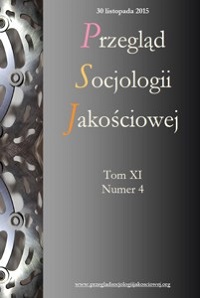Działanie, doświadczenie, wiedza. Wokół prac Harry’ego Collinsa
DOI:
https://doi.org/10.18778/1733-8069.11.4.08Słowa kluczowe:
studia nad nauką i techniką (STS), Harry Collins, wiedza ukryta, etnografia, mocny program edynburski, teoria aktora-sieciAbstrakt
W eseju recenzyjnym omawiam książki Harry’ego Collinsa i współautorów, które składają się na tak zwaną trylogię doświadczenia. Książki stanowią próbę teoretycznego uporządkowania wniosków z badań etnograficznych prowadzonych w ramach studiów nad nauką i techniką. Esej zestawia koncepcje Collinsa z propozycjami teoretycznymi Bruno Latoura i wskazuje potencjał ich zastosowań w obrębie badań jakościowych, szczególnie w ramach problematyki biegłości, doświadczenia i wiedzy ukrytej.
Pobrania
Bibliografia
Abriszewski Krzysztof (2012) Poznanie, zbiorowość, polityka. Analiza Teorii Aktora-Sieci Bruno Latoura. Kraków: Universitas.
Google Scholar
Afeltowicz Łukasz (2012) Modele, artefakty, kolektywy. Praktyka badawcza w perspektywie współczesnych studiów nad nauką. Toruń: Wydawnictwo UMK.
Google Scholar
Bijker E. Wiebe, Hughes Thomas P., Pinch Trevor (2012) The Social Construction of Technological Systems: New Directions in the Sociology and History of Technology. Cambridge, MA: MIT Press.
Google Scholar
Bloor David (1983) Wittgenstein: A Social Theory of Knowledge. London: Macmillan.
Google Scholar
DOI: https://doi.org/10.1007/978-1-349-17273-3
Callon Michel, Latour Bruno (1992) Don’t Throw the Baby Out With the Bath School! [w:] Andrew Pickering, ed., Science as a Practice and Culture. Chicago, London: University of Chicago Press, s. 343‒369.
Google Scholar
Collins Harry (1974) The TEA Set: Tacit Knowledge and Scientific Networks. „Science Studies”, vol. 4, s. 165‒186.
Google Scholar
DOI: https://doi.org/10.1177/030631277400400203
Collins Harry (1985) Changing Order: Replication and Induction in Scientific Practice. Chicago: University of Chicago Press.
Google Scholar
Collins Harry (2004) Gravity’s Shadow: The Search for Gravitational Waves. Chicago: University of Chicago Press.
Google Scholar
DOI: https://doi.org/10.7208/chicago/9780226113791.001.0001
Collins Harry (2010) Tacit and Explicit Knowledge. Chicago: University of Chicago Press.
Google Scholar
DOI: https://doi.org/10.7208/chicago/9780226113821.001.0001
Collins Harry (2014) Are We All Scientific Experts Now? Cambridge: Polity Press.
Google Scholar
Collins Harry, Yearley Steven (1992) Epistemological Chicken [w:] Andrew Pickering, ed., Science as a Practice and Culture. Chicago, London: University of Chicago Press, s. 369‒390.
Google Scholar
Collins Harry, Kusch Martin (1998) The Shape of Actions: What Humans and Machines Can Do. Cambridge, London: MIT Press.
Google Scholar
DOI: https://doi.org/10.7551/mitpress/6200.001.0001
Collins Harry, Evans Robert (2002) The Third Wave of Science Studies. Studies of Expertise and Experience. „Social Studies of Science”, vol. 32, s. 235‒296.
Google Scholar
DOI: https://doi.org/10.1177/0306312702032002003
Collins Harry, Evans Robert (2007) Rethinking Expertise. Chicago, London: University of Chicago Press.
Google Scholar
Dreyfus Hubert (1992) What Computers Still Can’t Do. Cambridge, MA: MIT Press.
Google Scholar
Dreyfus Hubert, Dreyfus Stuart (1988) Mind Over Machine. New York: Free Press.
Google Scholar
Fleck Ludwik (2014) Teoriopoznawcze rozważania nad historią odczynu Wassermana [w:] Ewa Bińczyk, Aleksandra Derra, red., Studia nad nauką i technologią. Wybór tekstów. Toruń: Wydawnictwo UMK, s. 25‒46.
Google Scholar
Hackett Edward J. i in. (2008) The Handbook of Science and Technology Studies. Cambridge, MA: MIT Press.
Google Scholar
Knorr-Cetina Karin (1981) Manufacture of Knowledge. New York: Pergamon Press.
Google Scholar
Lamont Michèle (2010) How Professors Think: Inside the Curious World of Academic Judgment. Cambridge, MA: Harvard University Press.
Google Scholar
DOI: https://doi.org/10.4159/9780674054158
Latour Bruno (2009) Polityka natury. Przełożyła Agata Czarnacka. Warszawa: Wydawnictwo Krytyki Politycznej.
Google Scholar
Latour Bruno (2010) Splatając na nowo to co społeczne. Wprowadzenie do teorii aktora-sieci. Przełożył Krzysztof Abriszewski. Kraków: Wydawnictwo Universitas.
Google Scholar
Latour Bruno (2012) Wizualizacja i poznanie. Zrysowywanie rzeczy razem. Przełożyli Aleksandra Derra i Maciej Frąckowiak. „Avant”, t. 3, s. 207‒257.
Google Scholar
Latour Bruno, Woolgar Steve (1986) Laboratory Life: The Construction of Scientific Facts. Princeton, NJ: Princeton University Press.
Google Scholar
DOI: https://doi.org/10.1515/9781400820412
Lynch Michael (1985) Art and Artifact in Laboratory Science: A Study of Shop Work and Shop Talk in a Research Laboratory. Cambridge: Cambridge University Press.
Google Scholar
Norman Donald A. (1988) Design of Everyday Things. New York: Doubleday.
Google Scholar
Polanyi Michael (1967) The Tacit Dimension. London: Routledge and Kegan Paul.
Google Scholar
Saldaña Johnny (2012) The Coding Manual for Qualitative Researchers. Los Angeles, London, New Delhi, Singapore, Washington: Sage.
Google Scholar
Sismondo Sergio (2011) An Introduction to Science and Technology Studies. Chichester: Wiley-Blackwell.
Google Scholar
Sokal Alan, Bricmont Jean (2004) Modne bzdury. Przełożył Piotr Amsterdamski. Warszawa: Prószyński i S-ka.
Google Scholar
Star Leigh Susan (1991) Power, Technology, and the Phenomenology of Conventions: On Being Allergic to Onions [w:] John Law, ed., A Sociology of Monsters: Essays on Power, Technology, and Domination. London, New York: Routledge, s. 26‒56.
Google Scholar
DOI: https://doi.org/10.1111/j.1467-954X.1990.tb03347.x
Pobrania
Opublikowane
Jak cytować
Numer
Dział
Licencja

Utwór dostępny jest na licencji Creative Commons Uznanie autorstwa – Użycie niekomercyjne – Bez utworów zależnych 4.0 Międzynarodowe.














